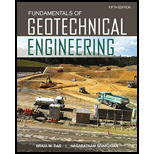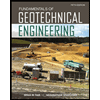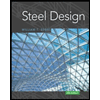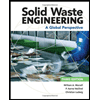
Concept explainers
In concrete work, Fuller and Thompson (1907) suggested that a dense packing of grains can be achieved if the percent finer (p) and grain size (D) are related by the following equation, where n is a constant varying in the range of 0.3-0.6. Dmax is the size of the largest grain within the soil.
This equation is sometimes used in roadwork for selecting the aggregates.
- a. For n = 0.5, show that the soil is well graded.
- b. If n = 0.5 and Dmax = 19.0 mm, find the percentages of gravel, sand, and fines within the soil. Use the Unified Soil Classification System.
(a)
Show that the soil is well graded for constant as 0.5.
Answer to Problem 2.15CTP
The soil is well graded for
Explanation of Solution
Given information:
The range of the constant
The constant value
Calculation:
Show the equation of percent finer as follows.
Here, D is the grain size and
For
Substitute
For
Substitute
For
Substitute
Calculate the uniformity coefficient
Divide Equation (4) by Equation (2).
Calculate the coefficient of gradation
Apply
The value of uniformity coefficient is greater than 6
Hence, the soil is well graded.
(b)
Calculate the percentages of gravels, sands, and fines in the soils based on the Unified Soil Classification System.
Answer to Problem 2.15CTP
The soil contains
Explanation of Solution
Given information:
The range of the constant
The constant value
The size of the largest grain within the soil
Calculation:
For percentage of fines the grain size
For percentage of sand and fines the grain size
Calculate the percentage of fines in the soil.
Substitute
Hence, the percentage of fines is
Calculate the percentage of sand and fines in the soil.
Substitute
Hence, the percentage of sand and fines is
Calculate the percentage of gravel in the soil.
Therefore, the percentage of gravel is
Want to see more full solutions like this?
Chapter 2 Solutions
Fundamentals of Geotechnical Engineering (MindTap Course List)
- H.W: From an in-out survey conducted for a parking area consisting of 40 bays, the initial count was found to be 20 vehicles. Table gives the result of the survey. The number of vehicles coming in and out of the parking lot for a time interval of 5 minutes is as shown in the table below. Find the accumulation, total parking load, average occupancy and efficiency of the parking lot. Table: In-out survey data Time (minutes) In Out 5 3 2 10 6 2 15 3 1 20 6 7 25 6 4 30 8 6arrow_forwardcan you show me step for step? Autocad has me irritated.arrow_forwardmummins) Is there any risk from a contaminant if 150 out of 3800 people exposed to the groundwater contaminant develop cancer and 125 out of 5000 people not exposed to the contamination also develop cancer? Why or why not? Use at least two methods to support your answer.arrow_forward
- A spare buoy is a buoyant rod weighted to float and protrude vertically, as shown in thefigure below. Suppose that the buoy is made of maple wood ( specific gravity s = 0.6), has arectangular cross section ( 2.54cm by 2.54cm ), a length of 3.7 m , and is floating in seawater( specific gravity s =1.025 ). What weight of steel should be added to the bottom end of thebuoy so that h=0.45 cm? ( The specific gravity of steel s = 7.85 )arrow_forward8-42. Determine the displacement at point D. Use the principle of virtual work. El is constant. 60 kN 2m- 2 m B 30 kN/m 3 marrow_forwardTwo monitoring wells are spaced 500 m apart along the direction of groundwater flow in a confined aquifer 30.0 m thick. The difference in water level in the wells is 2.5 m. The hydraulic conductivity is 40 m/d. a) Sketch the aquifer and wells and label distances and direction of groundwater flow. b) If the real velocity of the groundwater is 0.6 m/d, what is the porosity? c) If it takes 10 years for a petroleum hydrocarbon plume to appear in the second well, what was the retardation factor?arrow_forward
- 9. 0000) Water in a lake contains 10.5 ppb of vinyl chloride, which has a potency factor of 2.3 (mg/kg-d) 1 a. What is the incremental cancer risk for children (average weight of 15 kg) who may ingest 0.05 L of water per day while playing in the water every summer (for approximately 60 days) for 10 years? b. Is this risk acceptable? Why or why not?arrow_forward8-37. Determine the displacement of point C. Use the method of virtual work. El is constant. -12 ft- 3 k/ft -12 ft- Barrow_forward6. If the initial DO concentration of a diluted (1/50) wastewater sample is 9.0 mg/L and the UO concentration decreases to 2.4 mg/L after 5 days of incubation, a. calculate the 5-day BOD concentration in mg/L: b. If the wastewater degrades at a rate of 0.22/day, what is the ultimate BOD concentration? c. Based on the k value in part (b), what would the BOD concentration be after 10 days? d. What other factor may influence the BOD that is not accounted for in part (c)?arrow_forward
- 2nYour consulting firm is doing an expansion project for a drinking water treatment plant in a growing urban area that has a current population of 55,000 people and treats 20 MGD. If there is 2.8% population growth, continuously compounded, and you want the expansion to be able to serve the urban area for the 35 year design life of the upgraded facility, what should the new design capacity (in MGD) of the treatment plant be?arrow_forwardcan you show me step for step?arrow_forwardHow many steel studs are needed in total ? (Exterior walls are exsisting) Studs are spaced 16” OC Add 2 studs x each door & intersection How many 4 x 8 drywall sheets are required if walls are 8 ft high Exterior walls only need drywall on interior side Interior walls need drywall on both sides Show all workarrow_forward
 Fundamentals of Geotechnical Engineering (MindTap...Civil EngineeringISBN:9781305635180Author:Braja M. Das, Nagaratnam SivakuganPublisher:Cengage Learning
Fundamentals of Geotechnical Engineering (MindTap...Civil EngineeringISBN:9781305635180Author:Braja M. Das, Nagaratnam SivakuganPublisher:Cengage Learning Steel Design (Activate Learning with these NEW ti...Civil EngineeringISBN:9781337094740Author:Segui, William T.Publisher:Cengage Learning
Steel Design (Activate Learning with these NEW ti...Civil EngineeringISBN:9781337094740Author:Segui, William T.Publisher:Cengage Learning Materials Science And Engineering PropertiesCivil EngineeringISBN:9781111988609Author:Charles GilmorePublisher:Cengage Learning
Materials Science And Engineering PropertiesCivil EngineeringISBN:9781111988609Author:Charles GilmorePublisher:Cengage Learning Solid Waste EngineeringCivil EngineeringISBN:9781305635203Author:Worrell, William A.Publisher:Cengage Learning,
Solid Waste EngineeringCivil EngineeringISBN:9781305635203Author:Worrell, William A.Publisher:Cengage Learning, Traffic and Highway EngineeringCivil EngineeringISBN:9781305156241Author:Garber, Nicholas J.Publisher:Cengage Learning
Traffic and Highway EngineeringCivil EngineeringISBN:9781305156241Author:Garber, Nicholas J.Publisher:Cengage Learning Principles of Foundation Engineering (MindTap Cou...Civil EngineeringISBN:9781337705028Author:Braja M. Das, Nagaratnam SivakuganPublisher:Cengage Learning
Principles of Foundation Engineering (MindTap Cou...Civil EngineeringISBN:9781337705028Author:Braja M. Das, Nagaratnam SivakuganPublisher:Cengage Learning





